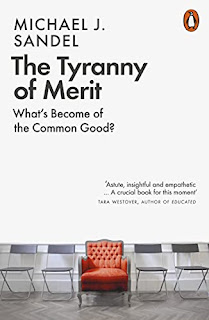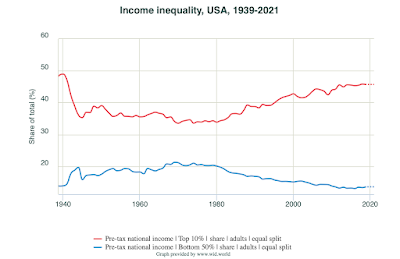It is a mistake to see only the bigotry in populist protest, or to view it only as an economic complaint… the election of Donald Trump… was an angry verdict on decades of rising inequality and a version of globalization that benefits those at the top but leaves ordinary citizens feeling disempowered. It was also a rebuke for a technocratic approach to politics that is tone-deaf to the resentments of people who feel the economy and the culture have left them behind… these grievances are not only economic but also moral and cultural; they are not only about wages and jobs but also about social esteem. (pp. 17, 18)Sandel locates these grievances in what he calls the technocratic conception of the public good and its corresponding meritocratic ethic. The former is “bound up with a faith in… the… belief that market mechanisms are the primary instruments for achieving the public good.” (pp. 19-20). Market-driven globalization has generated increasing inequality and devalued national identities. Those who benefit from it have “valorized cosmopolitan identities as a progressive, enlightened alternative to the narrow parochial ways of protectionism, tribalism, and conflict.” (p. 20). Sandel argues that by 2016, the Democratic Party had become the party of technocratic liberalism, which reflects more the interests of professional elites than blue-collar and middle-class voters.
Sandel contends that technocratic liberalism frequently employs a “rhetoric of rising” that holds that people “who work hard and play by the rules” should rise as far as “their talents will take them.” He notes that political elites on both the right and left invoke this phrase. Obama was particularly fond of using “you can make it if you try,” a line he employed more than 140 times in his speeches and public statements.
The problem is that not everyone can make it, not even those who try and do play by the rules. Economic mobility in the United States isn’t what it was 60 years ago. Consider, for example, the following graphs. The first (from “Our World in Data”) plots income inequality in the U.S from 1939 to 2021. As it shows, economic inequality began to increase in the late 1970s and early 1980s.
The second graph (from “Opportunity Insights”) plots mobility rates by birth cohort. Specifically, the y-axis represents the percentage of children who make more than their parents, and the x-axis indicates the year someone was born. It clearly shows that the dream that children born in America will have a higher standard of living than their parents has become less and less likely. Technocratic liberalism isn’t all that many believe it’s cracked up to be.
The meritocratic ethic that accompanies technocratic liberalism implicitly holds that those endowed with the gifts our market society rewards deserve more esteem than those who do not possess such talents. This has had harmful consequences:
Among the winners, it generates hubris; among the losers, humiliation and resentment. These moral sentiments are at the heart of the populist uprising against elites. More than a protest against immigrants and outsourcing, the populist complaint is about the tyranny of merit. And the complaint is justified…We see evidence of this in the language used to describe those who have not made it: “trailer trash,” “flyover states,” “those who cling to guns and religion,” “deplorables.” It also appears in the media. One study found that television shows portray blue-collar dads as stupid, impotent, and the butt of jokes - think Archie Bunker and Homer Simpson. By contrast, they portray upper-middle class and professional dads favorably. Facts like these have led Joan Williams, a professor at Hastings School of Law in San Francisco, to criticize and lament what she calls “the class-cluelessness” of progressives. (p. 202).
Meritocratic hubris leads winners to “inhale too deeply of their success… It is the smug conviction… that they deserve their fate, and that those on the bottom deserve theirs too. This attitude is the moral companion of technocratic politics” (p. 25)
Think what you want of Donald Trump, but he intuitively tapped into the sense of humiliation felt by many Americans. He appears to have been more aware of the malaise sweeping much of middle America than those of us who believe we have their best interest at heart. It’s difficult to tease out whether the politics of humiliation has disproportionately affected theologically conservative Christians (at least, I have yet to locate relevant data). Still, if it has, we shouldn’t be surprised that they hitched their future to the candidate who at least acknowledged their sense of humiliation.
Previous Posts
- Introduction (Why Do So Many Christians Support Trump?, Part I)
- Who are the 81%? (Why Do So Many Christians Support Trump?, Part II)
- The Rural-Urban Divide (Why Do So Many Christians Support Trump?, Part III)
- The Economic Divide (Why Do So Many Christians Support Trump?, Part IV)
- Ideas Matter (Why Do So Many Christians Support Trump?, Part V)
- The Appeal of Christian Nationalism (Why Do So Many Christians Support Trump?, Part VI)
- Reinhold Niebuhr, Religious Nationalism, and the Appeal of Authoritarianism (Why Do So Many Christians Support Trump?, Part VII)
References



No comments:
Post a Comment